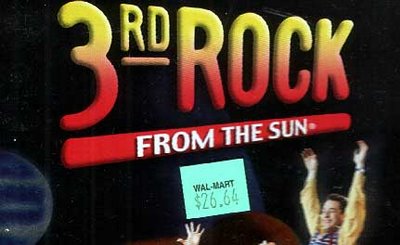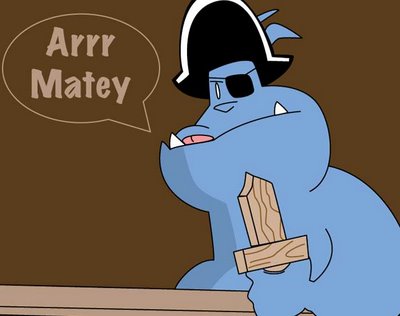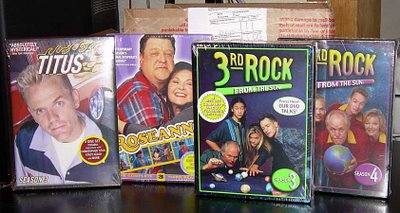 Image pinched from the Wikipedia entry on an especially weak episode of the Simpsons.
Image pinched from the Wikipedia entry on an especially weak episode of the Simpsons.It's no secret that the Simpsons has been on a slow decline for quite some time. Despite being a great Simpsons fan, I hadn't been watching since Season 15 and was unaware that the slide had ceased and that they were now bottom feeding on a regular basis.
Many people who have visited this topic far earlier and far more often than I have talked about where they believe the show has gone wrong. A lot of the decline can be laid at the feet of the writers and
Ian Maxtone-Graham whose involvement in the show seems to have signaled the show's decline. However, the Simpsons was rarely conventionally funny and in fact they often made things funny in the same way that Monty Python does; that is, through well-timed repetition, great line delivery and funny juxtaposition of various normally conventional lines.
The main problems I've noticed are as follows:
1. The voice actors aren't working together and it shows. In the commentary on the DVDs that have been already released, the show's creators and writers have mentioned on more than one occasion that the voice actors no longer do "table reads". A table read is where all of the actors sit around a table together and read through the script. This not only allowed them the equivalent of a live actor's rehearsal so they could fine tune their timing and line delivery but it also allowed jokes to be refined and comical ad libs to be included.
These days, all of the actors can record their lines remotely and then the pieces can be edited together. As of late, this is crystal clear in the way the lines are delivered. In particular, I've noticed that energy levels and emotional infusion between lines delivered by different actors are not matching. It seems especially noticeable with
Julie Kavner's lines for Marge Simpson. This messes with the "punch" of the lines. I believe it's also partially responsible for unfunny jokes running on far too long because the pacing isn't obvious from what is written on the page nor from the pieces being cobbled together in editing.
I'm not sure how long it has been since table reads were regularly done. It's possible they stopped a long time ago and there's been a slow decay in the rhythm of line delivery through time. I believe this is likely the single biggest factor in the show's decline and it's unlikely to ever change as the voice actors all have other work they are doing and probably find it impractical to work together physically now.
2. Too many meta-references.In the past, the meta references the Simpsons made tended to be appropriate within the context of the show and less obviously self-referential. Mainly, such jokes included references to Fox as a network. Such jokes occurred several times a season but it seems these days they can occur as often as several times per
episode and some are lame repetitions of meta jokes that have already been overdone. In particular, there are references to the Simpsons fame or merchandising, animation or animators, and the show's inconsistency with things like Homer and Marge's jobs.
Meta-references can be considered a wink and a nod to the audience but it looses its impact if it occurs too often. If you worked with a co-worker who was constantly making the same comment and winking at you, how long would it take before it'd cease to be amusing?
3. Too narrowly-known parody references.In early Simpsons episodes, classic movies or well-known cultural references were parodied such as Alfred Hitchcock's "The Birds" or Orson Welles's "Citizen Kane." Recent references included a White Stripes video that was re-created with Bart. It made no sense and wasn't the least bit funny. These sorts of references are done to showcase the guest voices (who increasingly appear to be there because of the personal interests of the writers or show runners and not because the audience may find their appearance of interest) rather than to add humor to the show. This is a case of the tail wagging the dog.
Narrow references only work when you explain them to the audience so they know what's going on. In the past, the Simpsons went out of its way to explain certain references (particularly music-based ones), such as the
Homerpalooza episode. Now, they're too lazy or indifferent to frame the references for those who aren't experienced with their source. Parody only works when most of your audience knows the reference and when it's done well. The Simpsons has been failing more frequently on both of these fronts.
4. Interchangeable characters.The Simpsons is a cartoon and you can expect some flexibility in how the characters are portrayed. Initially, Homer was used as the all-purpose character who was smart or stupid, a great or terrible father, hopelessly out of shape or athletic, etc. This back and forth for Homer was bad enough but acceptable for one character to give the show some flexibility in story lines but this sort of inconsistency bled over into Bart who has been both untalented and talented musically, obedient and disobedient, famous and unknown, and both a child and a man (doing adult jobs).
The next in line to be afflicted with serious character issues was Marge who started off as a wonderfully diligent and caring mother who was capable and moral and now sees more than her share of neglectful behavior toward her kids and immoral behavior. The last character to be corrupted is Lisa who has become increasingly shallow and morally labile when the story calls for it though her character has remained largely intact relative to the others.
The problem with this lack of character integrity is that the viewer loses all ability to relate to the characters in even the most minimal fashion and it guts the emotional impact which in turn undermines the humor. If, for instance, Ralph Wiggum is passive and dumb most of the time but on rare occasions says something oddly aggressive or smart, it's funny. If he says such things too often, the impact is lost and the comments are no longer funny.
One of the reasons humor is difficult to convey cross-culturally is that viewers from one culture can't relate to those from another. It is essential that the viewer identify with and empathize with characters for the comedy to work. When the characters become interchangeable, they cease to have a concrete personality you can find a foothold with emotionally.
5. Too gross, scatological, juvenile and tasteless.In general, it seems that the Simpsons are siphoning their content from the same wells of death, desperation, violence, and childishness. These wells are obvious, deep and broad but uninteresting. The best stories of the past were dug up from personal experiences that the writers had in real life which they adapted for use in the Simpsons. Now, it seems anything goes. Perhaps this means they need new writers with fresh experiences to draw from after so many years or that the show runners are content to allow the quality to lapse because they're profitable even with a half-assed show.
In a show I recently saw, Michelle Kwan uses her skates to cut up a judge's chest when he scores her badly. This was supposedly a "hotdogging" maneuver. In another episode, two gangsters have an exchange where one asks the other if he's still married to his sister and he says he's not because she's been dead for two years. Ned Flanders makes an incredibly violent biblical movie which is not only gross but also out of character for Ned. Mr. Burns is in a car crash and his lungs are his airbag which he sucks back in. In an episode which visits 8 years in the future, professor Frink's skeleton is seen hanging in his home to indicate that he committed suicide and his body was left here. All of this is just a little too black outside of a Halloween episode.
In general, it seems the Simpsons is starting to confuse itself with
South Park. This sort of nonsense only works about 1/5 of the time on South Park and it works almost not at all on the Simpsons.
6. Repeated story-lines from earlier episodes of the Simpsons and Futurama.Homer's antics allowed him to dance and show off as a baseball mascot in a very early episode. In season 16, Homer's antics allow him to become a teacher of showboating behavior for various sports figures. Bart traps homer on April Fool's with a beer. Bart traps Barney with a beer to get him hit in the face with a watermelon. Too many of the more recent episodes are vaguely familiar.
7. Heavy-handed social and political commentary.The aforementioned biblical movie made by Ned Flanders was an obvious reference to Mel Gibson's Passion of the Christ. Homer joins the army and we're treated to a great amount of Iraq war commentary. Springfield glacier melts and the guide tells us that the official stance is that global warming doesn't exist as Lisa points out that the glacier is now sludge. While I almost always agree with the Simpsons writers' politics, I don't find it amusing when these sentiments are waved in front of my face like a screaming banner. Such things are far funnier and more effective when they are subtle and represent rushed, lazy or hack writing.
8. Too many jokes at the characters' expense which are sad instead of funny.Fat jokes on a show like the Simpsons are an easy way to try and get a laugh since so many characters are rotund. When Homer is gearing up to take a shot at Flanders's pool table and says, "they don't call me Springfield Fats just because I'm morbidly obese," it's a funny fat joke. When police chief Wiggum, in reference to how he's not a good cop, says his badge is covered because his fat grew over it, it's just sad. When a character as oblivious to his faults as Homer makes a comment about his shortcomings (odor, weight, hair), it's funny because he's speaking with misplaced confidence. When Wiggum does it because he's feeling bad about himself, it's pathetic.
I believe this sort of "humor" started with Gil and has been expanded to other characters. The writers need to understand that it's not funny to kick someone when they're down on themselves or others are making fun of them unless the character has the confidence not to care or the zeal to fight back. I guess children who are 10 or younger who have parents that never taught them that mocking others is cruel may find it amusing.
•••••••••••••••••••••
A reasonable question to ask is why I continue to watch (even belatedly) if I don't think the show is funny (or even enjoyable) anymore. The answer is that I want to believe it can be funny again and am not quite ready to give up on it yet.

 The garbage bags show the discarded cases from the DVDs I put in albums. You can see how the small stack of albums would be vastly preferable to the huge number of cases if one were moving or paying shipping fees!
The garbage bags show the discarded cases from the DVDs I put in albums. You can see how the small stack of albums would be vastly preferable to the huge number of cases if one were moving or paying shipping fees!

















